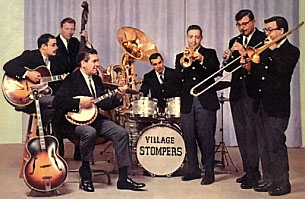THE VILLAGE STOMPERS
Washington Square
It's easy enough to evaluate the hit recording of "Washington Square" on face value by citing its tightly-woven, brass-heavy Dixieland jazz sound and folk-influenced banjo-picking opening bars, a combination that gave the eight-member Village Stompers an identifiable sound. But its impact runs deeper; the song will always be linked to the period of its popularity, transported from the southern bayou to New York City and the nation's capitol by virtue of its title alone, merged with the cold war and a morale-shattering tragedy, stirring up emotions that make it unique, entrancing, even chilling. On its own merits, it's a well-made jazz tune. For many who remember hearing the song firsthand, it's an indelible part of the music soundtrack of 1963.
The Dixieland movement of the early 20th century reached its peak in the 1920s and '30s with the genre's biggest star, trumpet/cornet master Louis Armstrong. A "trad jazz" revival begun in Great Britain around World War II extended into the 1960s with acts like Mr. Acker Bilk, Chris Barber, Kenny Ball and The Temperance Seven, all hitmakers in their native land, carrying on the tradition. Mix in America's folk music "boom" of the late '50s and early '60s and you've got the Village Stompers, a diverse New York-based octet with all the expertise needed to achieve a big sound. They appeared in early 1963 as Frank Hubbell and the Hubb-Caps with a Topix label instrumental produced by Bob Crewe called "Broken Date," led by Hubbell's trumpet playing, featuring a "Wild Side" and a "Bossa Nova Side" (a trade ad hyped it as the "wildest instrumental ever," but neither track really qualifies for such an extreme assessment).
The group's other seven members were trombonist Dick Brady, pianist Don Coates, Broadway-inclined guitarist Lenny Pogan, wind instrument specialist Mitchell May, drummer Al McManus, clarinetist Joe Muranyi (who brought a great deal of big band experience to the table) and banjo picker Ralph Casale (who later became a regular fixture at N.Y. studio sessions, on many of Crewe's productions and other hits). They were signed to Epic Records in short order and came up with the Village Stompers moniker, based on the Greenwich Village location of Washington Square Park (New Orleans' Washington Square fit into the puzzle, while the D.C. connection was more of a coincidence).
Songwriter Bob Goldstein had come up with an idea to combine the folk and Dixieland genres, resulting in "Washington Square" becoming the Stompers' debut 45, which developed at radio in September and climbed to number two on Cash Box magazine's singles chart the week of November 16 ("Deep Purple" by Nino Tempo and April Stevens was number one), peaking in the same position on Billboard a week later (behind "I'm Leaving it Up to You" by Dale and Grace). It was, perhaps, the most prominent song heard on the radio at the time President John F. Kennedy was assassinated on November 22. Goldstein had also written lyrics for the song, though vocal versions released by The Ames Brothers (on Epic) and The Kirby Stone Four (on Warner Brothers) were buried by the immense popularity of the Stompers' instrumental original.
The accompanying Washington Square album was also a top seller in late '63 and early '64. The song received two Grammy nominations (neither specifying the Village Stompers): one for composer Goldstein in the category Best Instrumental Theme (it lost to Riz Ortolani, Nino Olivero and Norman Newell's "More" from the film Mondo Cane), the other for producer-arranger Joe Sherman in the category Best Instrumental Arrangement (the winner: Quincy Jones, for his work on Count Basie's version of "I Can't Stop Loving You"). But the Village Stompers were set for the next few years, performing in large concert halls across America while recording a series of albums and singles.

"The La-Dee-Da Song" was a bouncy follow-up in early '64 but didn't generate much interest. The band had more luck that year with their covers of "From Russia With Love," the title theme from the second James Bond film, and "Fiddler on the Roof," the title number from Broadway's leading musical, both of which made brief appearances on the singles charts. "Oh! Marie" and movie theme "Those Magnificent Men in Their Flying Machines" benefited from airplay on the "middle of the road" (also called "easy listening") radio stations of the day. Frank Hubbell left in 1966 to form a similar band, The Washington Square Stompers, trying his luck with an instrumental version of "I Will Wait For You" (a great Michel Legrand-Jacques Demy song from the 1964 French film The Umbrellas of Cherbourg) on the Atco label.
Before calling it quits, the Stompers made several more albums for Epic, including the predictable 1964 sequel More Sounds of Washington Square and Live at the Copa, a 1967 performance backing Epic's top singer, Bobby Vinton. Their former trumpet man continued releasing music on Atco and Philips through 1968 as Frank Hubbell and the Stompers. The others figured the phase had run its course and continued working separately, doing session work and/or performing with various bands. Joe Muranyi had a run of good fortune after landing a steady gig with Louis Armstrong and his All-Stars that lasted into the early 1970s. But the original eight resisted any temptation to regroup, which, unless you were an active concertgoer in the mid-'60s, is why you've never seen The Village Stompers perform.


